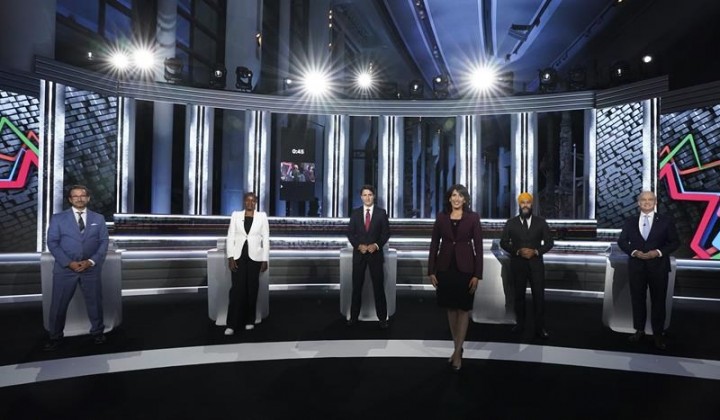OTTAWA — The next federal election debates should have a simpler format and better moderation to focus more on what leaders say than what they are asked, says the commission that oversees the events.
“There is widespread agreement that the 2021 debates did not deliver as well as they should have on informing voters about parties’ policies,” said the final report of the Leaders’ Debates Commission on the 2021 nationally televised events.
Many people look to leaders’ debates during an election for the elusive “knockout punch” moment, in which a politician gets such a good hit on an opponent that their campaign efforts nosedive.
But in 2021 it was a throw from a moderator that left the biggest impression. Shachi Kurl, the president of the Angus Reid Institute, asked Bloc Québécois leader Yves-François Blanchet why he defended “discriminatory” provincial laws about religious symbols and the French language, which she said marginalized minorities and anglophones.
Blanchet was incensed and accused Kurl of calling his province racist. Premier François Legault demanded an apology and most other leaders spent the following days responding to questions about whether they agreed with Kurl’s sentiment about the Quebec laws.
But it wasn’t just Kurl’s performance that left some viewers unhappy.
“A consensus emerged among the stakeholders consulted that the format was too rigid, too complex, too confusing, involved too many journalists on stage and did not sufficiently generate debate between the leaders,” the report said.
There were also too many questions.
During the 2008 election debate, there were eight questions posed to the leaders in the two-hour time frame. In 2021, that almost quadrupled to 45.
The commission is recommending it get the final say on the format and the moderator, following consultations with experts.
It was the second election during which the leaders’ debates — one in French and one in English — were hosted by the commission. Viewership of both debates plummeted, but more so on the English side.
The French debate drew a total audience of 4.3 million in 2021, compared with five million in 2019. The English debate audience came in at 10.3 million, down from 14.2 million two years earlier.
The commission, headed by former governor general David Johnston, said low viewership could be blamed in part on the election itself, which came at the tail end of summer during a pandemic, with lower voter engagement overall and lower turnout in the end.
But the report said it was clear that the debates failed to substantially improve what people knew about party policies, which is a problem.
Before 2019, election debates were put on by a consortium of television networks, who worked with the political parties to determine timing and format. In 2015, then-prime minister Stephen Harper refused to participate in consortium debates in English, though he ultimately did one in French.
Multiple English debates were held that year, hosted by different media organizations and think tanks, with comparatively low viewership. The English viewership ranged from 1.5 million to 4.3 million for three debates, and the two French debates had audiences of 985,000 and 1.2 million.
The debates commission was then formed in 2018 to create a better experience. The report on the 2021 events said there is still work to do to make the debates better, but said it still believes having a permanent, publicly funded debates commission is the right decision.
This report by The Canadian Press was first published May 10, 2022.
Mia Rabson, The Canadian Press
